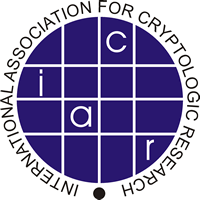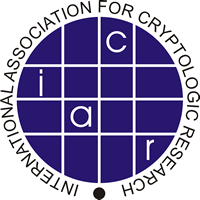
ulrich.haboeck
@UHaboeck
Followers
936
Following
7K
Media
6
Statuses
414
Mathematician, cryptographer. Love the art of cryptographic protocols.
Milano
Joined September 2021
The soundness of Basefold (for RS codes) in the list decoding regime:.
eprint.iacr.org
In this writeup we discuss the soundness of the Basefold multilinear polynomial commitment scheme [Zeilberger, Chen, Fisch 23] applied to Reed-Solomon codes, and run with proximity parameters up to...
1
12
54
RT @liameagen: Check out recent work with @rel_zeta_tech exploring the (known but imo under appreciated) IPA sumche….
eprint.iacr.org
Inner Product Arguments (IPA) [BCC+16,BBB+17] are a family of proof systems with $O(\log n)$ sized proofs, $O(n)$ time verifiers, and transparent setup. Bootle, Chiesa and Sotiraki [BCS21] observed...
0
13
0
RT @rel_zeta_tech: A few words on recent paper with @liameagen. A drawback of IPAs is the linear time verification. This was partially miti….
0
6
0
RT @zeroknowledgefm: Join @adr1anh and @andrewmilson at zkSummit to explore their novel approach to FRI low degree testing. Their work intr….
0
8
0
RT @rel_zeta_tech: recommend watching the first talk of RWC today on EU digital identity status
0
49
0
RT @Lhree: [New] Designated-Verifier SNARGs with One Group Element (Gal Arnon and Jesko Dujmovic and Yuval Ishai)
eprint.iacr.org
We revisit the question of minimizing the proof length of designated-verifier succinct non-interactive arguments (dv-SNARGs) in the generic group model. Barta et al. (Crypto 2020) constructed such...
0
3
0
RT @ronrothblum: Exciting new work by @GalArnon42 and Eylon! They suggest a new mitigation against our recent FS attack, which is different….
0
10
0
RT @GalArnon42: Delighted to share my new paper with Eylon Yogev presenting a new Fiat-Shamir (FS) transformation that aims to be secure ag….
eprint.iacr.org
The Fiat–Shamir transformation is a fundamental cryptographic technique widely used to convert public-coin interactive protocols into non-interactive ones. This transformation is crucial in both...
0
36
0
Uploaded a revision of the note on adding zk to STARK, Should be much more readable now, hopefully, and it adds a short discussion on perfect zero-knowledge in permutation arguments.
eprint.iacr.org
We discuss zero-knowledge in the context of univariate argument systems which use the FRI proximity test for Reed-Solomon codes as polynomial commitment scheme. We confine ourselves to small-field...
1
23
96
RT @ronrothblum: 1/ Excited, but frankly quite worried, about a new work with the wonderful @levs57.and @Khovr: We….
eprint.iacr.org
The Fiat-Shamir (FS) transform is a prolific and powerful technique for compiling public-coin interactive protocols into non-interactive ones. Roughly speaking, the idea is to replace the random...
0
149
0
RT @mschofnegger: With Skyscraper, we show for the first time how hashing over large primes can achieve the same native speed as hashing ov….
eprint.iacr.org
Arithmetic hash functions defined over prime fields have been actively developed and used in verifiable computation (VC) protocols. Among those, elliptic-curve-based SNARKs require large (256-bit and...
0
20
0
A smol but extremely elegant tweak, that unlocks fractional decomposition lookups for binary fields:.Thanks to @liameagen for approaching me with this solution!.
eprint.iacr.org
In this informal note, we describe how to bypass the characteristic bound in logUp [eprint 2022/1530] by abstracting the notion of (pole) multiplicity. The method applies as well to the GKR-variant...
2
20
65
RT @PratyushRT: Is Google's quantum chip coming for your wallet keys? . Let's break down Google's new Willow quantum chip announcement and….
0
7
0
RT @fermatslibrary: 2¹³⁶²⁷⁹⁸⁴¹−1, discovered today, is the largest known prime. It's a Mersenne prime (2ᵖ-1), which are easier to find. It….
0
5K
0
RT @GalArnon42: Blazing SNARKs! Cool new work by Martijn Brehm, Binyi Chen, Ben Fisch, Nicolas Resch, Ron Rothblum, and Hadas Zeilberger. @….
eprint.iacr.org
In this work we construct a new and highly efficient multilinear polynomial commitment scheme (MLPCS) over binary fields, which we call \emph{Blaze}. Polynomial commitment schemes allow a server to...
0
5
0



